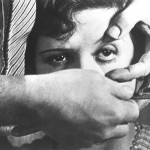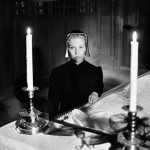Tag: Cold War
-
Media Blackout
“I’m a Communist because I want the people to take the power that comes with ownership away from the little class of capitalists who have it now.” Subtle, eh?
-
Living with Miller
After living with Miller for the last few days — after rereading The Crucible and After the Fall and a three inch stack of photocopied criticism — I’ve come to one significant conclusion: I don’t like Miller. His early work shows an obvious knack for wrenching every last drop of sentiment and inevitable heartbreak from a tragic narrative, but, damn, they are really unpleasant to read. His language is starving for poetry.
-
The Great Work Begins
If Sullivan reads Angels in America as a Stalinist tract, then I pity his ideological blindness. He’s missing a hell of a play.
-
Friday Colloquy
On Friday afternoon I subjected myself to ninety minutes of critical scrutiny by a group of professional historians. And it ended up being a damn good time.
-
A Writing Exercise
I spent my lunch hour over in the library, where I went snooping for some old Arthur Miller essays. Most have been collected in fine editions, of course, but I like to put my hands on the originals.
-
Happy Anniversary
I’d forgotten that the execution was delayed by several hours because Eisenhower and his cronies thought it unseemly to execute Jews on the Sabbath. Apparently they weren’t as troubled by the other quirky problem posed by the date: Julius and Ethel died on their fourteenth wedding anniversary.
-

Un Chien Andalou
My favorite discussion of the famous eye-slicing sequence can be found in Virginia Carmichael’s Framing History, where she compares Bunuel’s film to E.L. Doctorow’s The Book of Daniel, a novel that attempts to make sense of the early Cold War years.
-
The Agony of the American Left
Spanning the years from the Populist movement of the 1890s to the radical politics of the 1960s, Lasch’s study offers a useful analysis of many of the social, economic, and political forces that have combined to frustrate the American Left in its search for a politically potent mixture of theory and action.
-
Kennan and Containment
I had no idea that George Kennan was still alive. The man who literally wrote America’s containment policy, the policy that has directed our foreign policy for nearly sixty years now, is 98 and living in Georgetown.
-
The Culture of the Cold War (1991)
The Culture of the Cold War is divided into chapter-long studies of the major voices of popular culture, each of which, according to Whitfield, reflected and contributed to the polarity that characterized so much of the 1950s.
-
American Fiction in the Cold War
Schaub focuses the majority of his attention on the early post-war years, turning to the New York Intellectuals—Howe, Trilling, and Schlesinger, in particular—for his diagnosis of the crisis at the heart of the American Left at the start of the Cold War.
-
The Public Burning (1976)
At the site of the execution—fantastically transposed from Sing Sing to the middle of Times Square—Nixon appears with his pants around his ankles, fully erect, then brings the crowd to a riotous frenzy as history dissolves around them.
-

Day of Wrath (1943)
Day of Wrath is a damning critique of hypocritical authoritarian power told in very human terms, a modern fable that interrogates faith and sin, love and family, desire and its consequences.